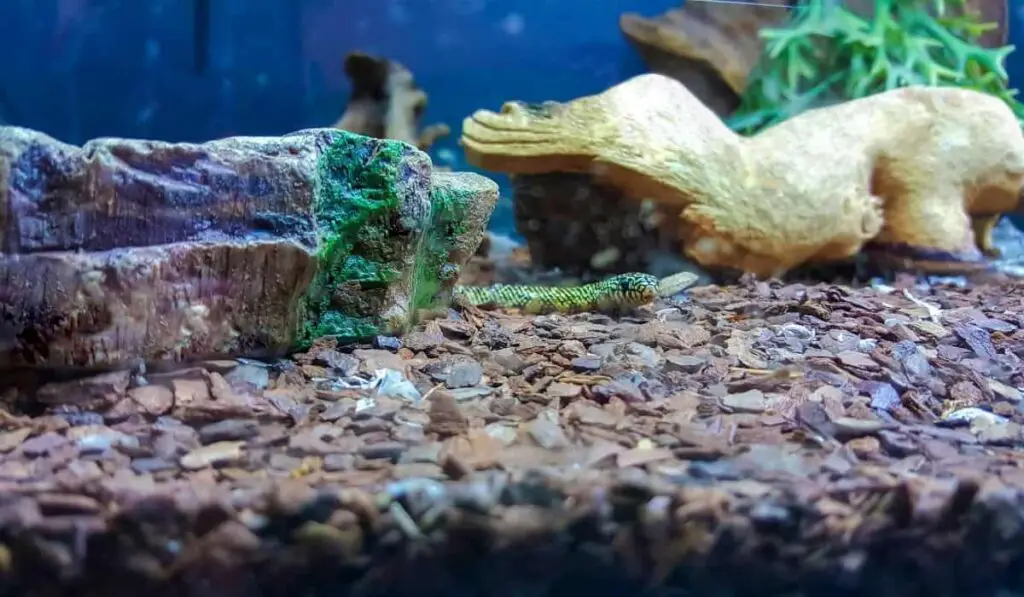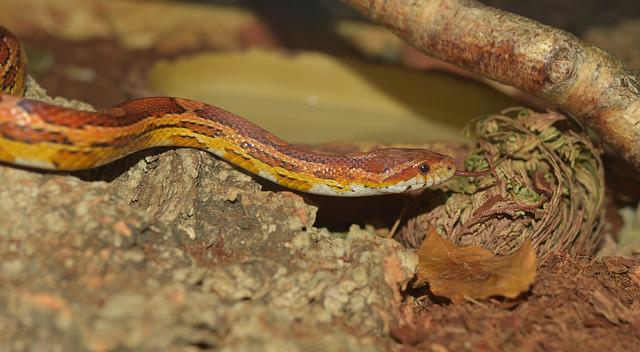Most animals need to sleep. This is a way of allowing the mind and body to recharge. Sleep is observed in humans and all mammals but also in a wide variety of other creatures. Even sharks which are known to keep swimming constantly have restful periods, even though this is not sleep as we know it.
Therefore, it would stand to reason that snakes need to sleep in one way or another. So, do snakes sleep?
Snakes do need to sleep and it has been observed that they, and other reptiles, have the ability to fall into a deep sleep. Something that is known as REM (rapid-eye-movement) sleep.
So, with that in mind, let’s take a look at just how a snake sleeps and how it uses this essential function to thrive.
How Do Snakes Sleep?
Snakes and humans are markedly different; they look different, they eat a different diet and their breeding methods are different to our, but in some respects we are closer than you might think.
Sleep is one such example of this. Snakes and many other reptiles are known to sleep in much the same way as humans. They have been seen to fall into a state of REM sleep but also go through another sleep stage that we do call slow-wave sleep.
But this is where the similarities end.
Eyes Wide Open
When you and I go to sleep, we close our eyes and everything goes dark. It would be pretty difficult to imagine sleeping with your eyes open but in the case of the snake, he has no choice.
Snakes do not have eyelids, so they cannot close their eyes. But this doesn’t mean that they don’t sleep, it’s just a little different than what we are used to.
Snakes not only sleep with their eyes open but they also cannot blink. Many pet owners’ first thoughts might be about the health of the snake’s eyes; surely they would become dry and irritated without the ability to blink. But this is not the case.
In place of eyelids, the snake has one scale over the eye, this is clear so does not obstruct their vision and serves as a way of protecting the delicate eye beneath.
Do Snakes Brumate?
Brumation is a period of time when a reptile becomes less active. It happens in the winter when the weather turns cold and the supply of food runs low. It is often compared to hibernation in mammals but differs slightly in that reptiles do not go into full sleep.
Snakes are one of the creatures that brumate and while they will not be fully asleep, they will be much more dormant and their eating will diminish to almost nothing.
In the wild, brumation is almost essential in order for the snake to survive. However, when they are kept in captivity, these animals do not need to brumate.
A lot of the time, they won’t but if you do notice that your snake appears to be brumating, it is best to let him get on with it. Just make sure that you keep an eye on him to avoid any health problems or significant weight loss.
Do Snakes Sleep For Long?
Humans require between six and nine hours of sleep each day and the rest of the time is spent working, playing and going about our waking lives. It can be easy to think that a snake would be the same, but you might be surprised to learn that your pet is asleep for a lot longer.
In the main, snakes usually need around sixteen hours of sleep a day, although it is not uncommon for them to exceed this and have a 20-hour snooze.
However, there are various factors that will affect the amount of time they sleep. This could include the time of year and when their last meal was. If your snake has just had a substantial meal, she is likely to sleep it off.
So, next time you see your snake sitting quietly in her enclosure with her eyes open, she might be sleeping.

How Do I Know If My Snake Is Asleep?
One of the greatest things about having a pet is being able to interact with them but you wouldn’t want to repeatedly disturb your snake’s slumber. It is a good idea to try and determine whether your snake is asleep or merely chilling out before you try to handle him.
It is difficult to tell whether a snake is asleep, especially in the wild. Fortunately, it is a little easier when they are kept in captivity. As a general rule, if your snake is awake, he will likely be moving around and interacting with his environment.
However, there will be plenty of times that your snake will be just sitting in a branch or having a quiet moment, this can make it a little more tricky to tell what he is doing.
If you attempt to handle your snake and he shows any sign that he does not want to be touched, this could be an indication that you have disturbed him and it is a good idea to let him carry on sleeping.
Are Snakes Nocturnal?
There are more than 3000 different species of snake in the world so there cannot be a simple answer to the question of whether they are nocturnal.
A lot of snakes do sleep during the day and hunt at night but there are also those that do not. But just to complicate things a little more, it is also worth keeping in mind that some snakes will be active both during the day and at night.
This will again depend on certain factors including whether they need to feed or what time of year it is.
Conclusion
Snakes do need to sleep, and while they do sleep in a similar way to humans, in that their sleep states are the same, their behavior is vastly different.
For starters, snakes have no eyelids and therefore sleep with open eyes. Furthermore, they may or may not be nocturnal and definitely need a lot more sleep than their human counterparts.
So, before you take your snake out of her enclosure for some bonding time, keep in mind that she may be catching forty winks.




